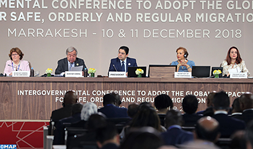
International Migrant Day
“For them there was no place” (Luke 2:7) …
the unwillingness to accept does not change despite the continuing humanitarian disasters
The phenomenon of migration has existed since the dawn of time. But in an era characterised by globalisation, it has reached new proportions and outlines entirely new problems of reception or rejection compared to our past. “Migrants are the deepest scar of globalisation: we do not treat them as citizens, but in the end not even as men”. (Julia Kristeva)
The scar, however, appears as a sore in the flesh when it comes to first, second and third generation foreigners and, as is increasingly the case, ‘unaccompanied minors’, children and adolescents, who land in Italy to chase the mirage of easy earnings for themselves and, above all, to send to their families. This is crudely revealed by the TG2 Dossier of 3 December filmed in the Milan area, in which the protagonists themselves, the children, recount the horror and heartbreak of their migratory project. The religious and secular institutional figures involved in repairing what is almost irreparable of their young lives also speak of it.
Many have passed through the worst of the adult world and, once they arrive, are often forced to exist in the shadows, exposed to the risks of exploitation abuse and trafficking, or, simply, to disappear, after suffering and wounds to the body and mind suffered during their journeys, especially if they ‘stop’ for months and years in the lagers of Libya. But the phenomenon does not only concern Italy.

Foto: vaticanews.it
They range from teenagers to toddlers, there is no age limit, the common trait among them is that they are foreigners and unaccompanied, and forced to leave their countries for reasons that are always dramatic, ranging from war to economic hardship. The numbers of unaccompanied foreign minors disappearing in Europe are frightening. Across Europe, 18,292 disappearances are reported between 2018 and 2020, with Italy at the top of the list. However, the data remains incomplete, because there are states that do not even start the count. The collective of journalists from 12 European states, ‘Lost in Europe’, in the wake of the alarm launched in 2016 by Brian Donald, a Europol official who had reported the disappearance of 10,000 foreign minors every year, has been following the cases of disappearances for a couple of years and has now decided to ask the various European countries for the official numbers of missing minors. Discouraging replies have come from many states, ranging from Denmark, which does not report minors disappearing from centres, to France and Great Britain which, Lost in Europe reports, for different reasons have not provided the information.”
(source: https:www.vaticannews.va)
On International Migrants’ Day 2022 – proclaimed by the UN in 2000, with the aim of drawing the world’s attention to the fate and problems of people who have left their country of origin due to conflict, war, human rights violations and poverty-
We ask forgiveness for all that
we do not want to see.
WE OF THE GOOD SHEPHERD
#facciamoladifferenzacoimigranti

Photo: www.primabergamo.it
“But if I, today, ignore the poor, leave them aside,
believe they are not there, the Lord will ignore me on the day of judgement…
this is the centre of the Gospel: we will be judged on this.”
Pope Francis
http://www.korazym.org
THE GREAT INTERNATIONAL DECLARATIONS AND CONVENTIONS
ARE NOT ALMOST SUFFICIENT…Italy, among others has not even signed the Global Compact for Migration.

The Global Compact for Safe, Orderly and Regular Migration (GCM) is an intergovernmental agreement and negotiation, prepared under the auspices of the United Nations, that covers all dimensions of international migration in a holistic and comprehensive manner.
Italy is not among them, along with many other countries including the United States, Austria, Australia, Bulgaria, Chile, Croatia, Czech Republic, Dominican Republic, Estonia, Hungary, Israel Latvia, Lithuania Poland Slovakia.
The aim of the Global Compact is to ensure that migration takes place in a safe, orderly and regular manner by increasing cooperation in addressing the causes of migration, combating human trafficking and smuggling of migrants, border management and facilitating returns.
The pact also aims to foster the search for pathways to legal migration within a framework of international cooperation. It will also support the EU’s ongoing work with third countries and international organisations, such as the International Organisation for Migration (IOM) and the United Nations High Commissioner for Refugees (UNHCR).



